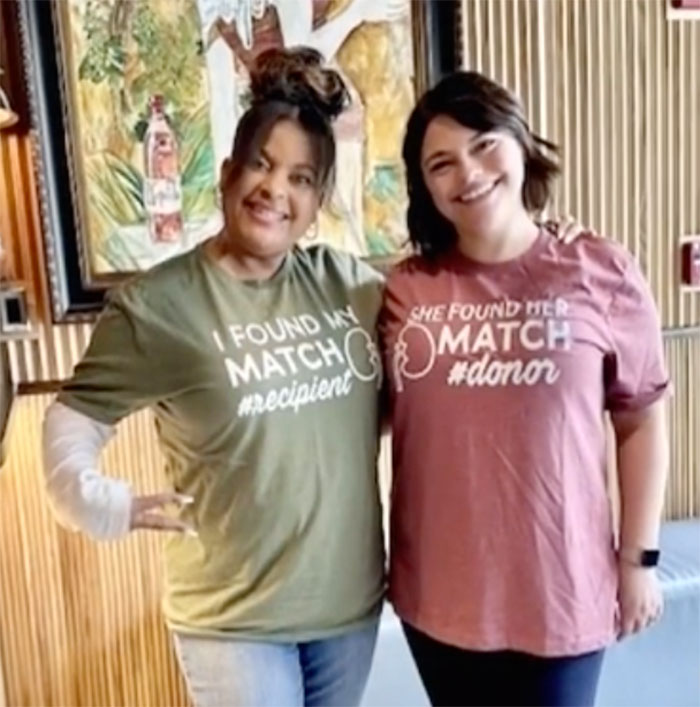
Cecilie Nelson & Callie Gilmore
“So, we had this big meeting with all of us and we kind of talked about what we had done over our summer,” Gilmore explained.
In 2021, Nelson’s sister–Dr. Kelli Jones, a clinical assistant professor in the College of Nursing at Marquette University–met Gilmore.
“I said that I had been in California for most of the summer because (of) my sister who has chronic kidney disease and that she just wasn’t doing very well,” said Jones. “And she just comes up to me at the table and says, ‘I would donate a kidney to your sister,’ and I’m like ‘what? What do you mean?”
“I had actually already been in the process of being worked up for kidney donation for somebody else who I had seen just on Facebook,” Gilmore went on to explain.
But Gilmore said that plan fell through. She was now more inclined than ever to save someone else’s life.
“Just seeing that and knowing, like, I have two, like, and I really only need the one,” she said giggling. “For me, like, surgery didn’t’ seem like that big of a deal.” Nelson said she recalled receiving a phone call from her sister immediately after that conversation happened.
“My sister called me and said ‘you’re not going to believe this… I just spoke to someone, and she said that she was willing to donate, I’ve never met her, I don’t know much about her, she’s already going through the process,” Nelson recounted.
The foundation for this story began some 20 years earlier when Nelson was going through a routine checkup in 2003 and a diagnosis changed her life. She had stage two CKD.
“From there it was managed for you know 15 plus years on medication and lifestyle,” she said. Nelson said that for her, it became a part of her day to day.
“Until it started to progress,” she said. “We did a second biopsy in 2017, by 2019 I was on the transplant list.”
Kidneys are a vital organ that makes sure the body functions properly. They don’t only filter what your body doesn’t need but it also produces the things you do need.
In 2023 more than 88,000 patients were on a waiting list to receive a kidney (organ donation statistics | organdonor.Gov). Less than 16,000 however, actually ended up having a transplant.
“I was aware of the different types of donations that there are: direct donation, decease donation, living donation, voucher program,” Nelson said.
Nelson and Gilmore participated in the National Kidney Registry’s Voucher Program.
“I listed her as my intended recipient and by getting that voucher she essentially went up, like, the donation list,” Gilmore said.
Gilmore was able to do this even though she was not a direct match for Nelson and her actual kidney did not end up going to her.
“Actually, by donating indirectly and donating to whoever is the best match for your kidney, that person that you’re donating for gets the best match for them,” Gilmore explained.
Gilmore’s kidney recipient had their transplant surgery the same day, just hours after the organ was removed from Gilmore’s body.
“They took it in like a cooler and drove it really quickly to O’Hare (airport) and then got it on a plane and flew it across the country,” she added.
Although she may never know who directly benefited from her selfless act, Gilmore does know a piece of herself now lives on, in someone else in Texas.
“We live in a time where women’s bodies are so, like, objectified and people just focus on what you look like on the outside and it was really cool for me to, like, walk out of the hospital and be like: my body just did something incredible,” Gilmore said. “To share part of my body in a way that is going to let somebody have a much higher quality of life.”
“Blood pressure and protein in your urine are telltale signs of chronic kidney disease, which is referred to as CKD,” Nelson explained. Nelson received her transplant on October 18, 2022. “I just say that she’s our angel on Earth and I’m just so, so thankful for her,” said Jones.
Last March, months later, Nelson and Gilmore met for the first time in person. “Meeting her, it was funny, we had things in common, it was easy,” said Nelson.
They still keep in touch. In fact, come this May, they’ll head over to Washington D.C. for the American Kidney Fund Kidney Action Summit to share their story and bring awareness when it comes to health disparities.
“You think that’s the end and you’re better and everything is great, but actually, that just begins a different chapter,” Nelson concluded.
